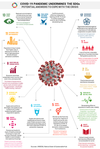The COVID-19 pandemic mutates into a multi-faceted crisis. Its duration, scope and consequences are hardly predictable. Its frenetic propagation has led to an unprecedented mix of coercion and economic heft: countries lockdown, borders closure, travel ban, social distancing enforcement through mobile technologies, prices controls and goods requisitions, ultra-loose monetary policy and assets purchasing programs from centrals banks (corporate bonds on the primary market and short-term debt by the FED, sort of public debt monetization in the Eurozone by the ECB), direct-cash payments mirroring universal basic income, debt reliefs (call for a moratorium on the bilateral sovereign debt payments in the Paris Club Framework, with a first cancellation of $1.4 billion of Somalia's debt), stimulus package amounting sometimes more than 10% of GDP. Political taboos are fading one after another…
A new model is in the making and sustainable finance is poised to be both the instrument and the recipient of our socio-economic system overhauling. The tenet of the 2030 Agenda on the interlinkages between the 17 SDGs appears more compelling than ever. Lockdown measures aggravate poverty and exacerbate social and gender inequalities. While lockdown measures result in sharp reduction of pollution and greenhouse gas emissions, the call that safeguarding the economy should not be at the expense of climate change surfaces. One worries that emergency measures and then stimulus packages could torpedo our last chance to limit climate change.
The green share of “recovery plans” will be under scrutiny. Meanwhile, we consider that “Whatever it costs” policies are of no consequence on the irrefutable truth that every euro can only be spent once. Neither all the sectors or companies display the same resilience to the crisis or climate footprint, nor can they all be bailed out. It is why we believe that, whenever possible, budget transparency, earmarking of proceeds and impact assessment are vital because they underpin trust. Especially for sovereign issuers, they underlie confidence not only vis-à-vis investors but also taxpayers and are the best vaccines against conspiracy theories and fake news.
This crisis might have remanent or hysteresis effects. It has roots in neglect for biodiversity (animals’ habitat destruction caused by deforestation leads to a rise of zoonotic diseases) and makes calls for de-globalization louder. Supply chains will be further reshuffled and shortened. This crisis also questions our societies’ relation to science. Decision-makers will be hold accountable with greater liability risks, it challenges essential notions like consent to lifestyle sacrifices. Both in facing pandemics and climate change, unpreparedness and lack of resilience lead to situations where the curse can be worse than the disease but where we are left with no choice.
Natixis Green & Sustainable Hub will publish a comprehensive report about pandemic’s remanent effects. We are conducting an investor consultation on their strategies and expectations vis-à-vis “Covid-19 bonds” should they be explicitly labelled as such or simply issued to cope with the new circumstances and subsequent funding needs.
Stay tuned and feel free to contact us should you want to discuss the matter or participate to the investor consultation.



